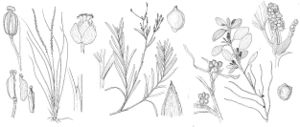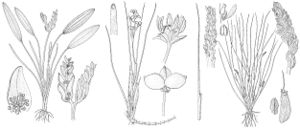Juncaginaceae
Herbs, perennial or annual, rhizomatous, evident stems absent; turions absent. Leaves basal, emersed, sessile; sheath persisting longer than blade, not leaving circular scar when shed, ligulate, auriculate with scarious lobes; blade linear; intravaginal squamules scales, more than 2. Inflorescences terminal or axillary, scapose spikes, spikelike racemes, rarely solitary flowers, without spathe, pedunculate; peduncle following fertilization not elongating, not spiraling. Flowers bisexual or unisexual, staminate and pistillate on same plant; subtending bracts absent; perianth present, rarely absent; tepals 1, or 6 in 1–2 series. Bisexual and staminate flowers: stamens 1, 4, or 6, epitepalous, when 4 or 6, then in 2–3 series; anthers distinct, dehiscing longitudinally; pollen globose. Pistillate and bisexual flowers: pistils 1, 3, or 6, not stipitate, when 3 or 6, coherent or weakly connate; ovules basal, anatropous. Fruits nutlets or schizocarps. Seeds 1; embryo straight.
Distribution
Nearly worldwide.
Discussion
Genera 4, species ca. 15 (2 genera, 5 species in the flora).
Selected References
Lower Taxa
Illustrations
Key
| 1 | Inflorescences both scapose spikelike racemes with bisexual and unisexual flowers and sessile with pistillate flowers; pistils 1 | Lilaea |
| 1 | Inflorescences all scapose spikelike racemes with bisexual flowers; fertile pistils 3 or 6 | Triglochin |

